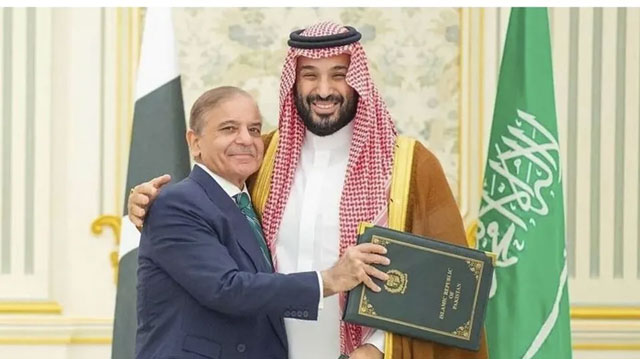Daijiworld Media Network - Riyadh/Islamabad
Riyadh/Islamabad, Oct 26: The recently signed strategic partnership and joint defense agreement between Saudi Arabia and Pakistan is being hailed as a turning point in the evolving power dynamics of the Middle East. The agreement signifies more than a traditional security alliance — it signals the beginning of a new regional order founded on self-reliance, cooperation, and shared Islamic strength.
The landmark accord envisions joint military production and defense cooperation, blending Saudi Arabia’s vast financial resources with Pakistan’s military expertise to create a sustainable model of Arab-Islamic defense capability. The collaboration aims to reduce dependence on Western powers for regional security and defense equipment.

This historic step follows the recent Israeli strike on Qatar and the United States’ refusal to intervene, an episode that sent a powerful message to Gulf states about the limits of relying on external powers for protection. The incident has since accelerated regional efforts toward strategic autonomy.
Pakistan, a nuclear power with decades of experience in defense technology, missile development, and drone production, emerges as a natural partner for this initiative. In contrast, Saudi Arabia brings the financial might, infrastructure, and diplomatic influence necessary to anchor the project. Together, they seek to establish an Arab-Islamic military-industrial base capable of ensuring long-term security and stability.
Analysts note that the partnership could pave the way for a broader Arab-Islamic defense alliance, often described as an “Islamic NATO,” to jointly confront regional threats, terrorism, and cyberwarfare. Beyond defense, the initiative is expected to lay the groundwork for economic and commercial integration, potentially leading to the creation of a common Arab-Islamic market.
Such a market could enhance intra-regional trade, attract investment, and foster innovation while reducing reliance on Western economies. Observers believe that combining Arab capital with Pakistani and broader Islamic expertise could unlock unprecedented opportunities in defense, technology, and energy sectors.
While challenges remain — including potential opposition from Western powers and internal divisions within the Islamic world — experts view the agreement as a symbol of renewed unity and strategic awakening.
The Saudi-Pakistan pact, therefore, is not just a bilateral arrangement but a blueprint for a new era in which Arab and Islamic nations take charge of their own defense and economic destinies. It marks a shift from dependence to independence, reaffirming that the future of regional security and prosperity lies within the collective strength of the Islamic world itself.